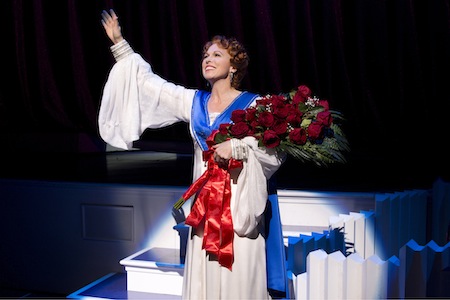A Little Fire and Brimstone

Scandalous: the Life and Times of Aimee Semple McPherson
Neil Simon Theater
W. 52d St.
New York, N.Y.
Evangelist Aimee Semple McPherson was an iconic figure in American religion for more than twenty years. The preacher opened one of the largest churches in the world, the Angelus Temple, in Los Angeles, in 1923, was the first woman to have her own coast-to-coast radio show, published her own magazine, led tour groups to the Holy Land, and was a pop cultural figure known far and wide for several generations.
Her life in Hollywood, where she rose to glory, was laced with scandals. She married three times and grabbed worldwide headlines when she was allegedly kidnapped, held for thirty days, fled and turned up unannounced in a little village in Mexico. She was the basis for one of the stars in the film Elmer Gantry.
McPherson was the Billy Graham of her era and, in fact, Graham and all modern evangelical preachers and television evangelists based their crusades and television programs on Aimee’s work back in the 1920s.
She is the central figure of Scandalous: the Life and Times of Aimee Semple McPherson, with book by Kathie Lee Gifford and music by David Pomeranz and David Friedman, which opened last week in New York.
Scandalous is really two shows. The first is a 45-minute biography of McPherson, ending with her tub thumping arrival in Los Angeles. The second is her life as a preacher, her fame and her troubles. The first is excruciatingly slow moving and tedious, a traditional boilerplate Broadway musical and hard to get through, but the second half is pretty good, its own Aimee revival show.
The musical tells the story of McPherson’s rather difficult life. Her first husband, Robert Semple, a missionary, died on a visit to China. Her second husband was a nondescript accountant. Her pushy mother, a religious fanatic, left her own husband back on the farm and moved to New York. Aimee heard the call as a young woman and took off on a speaking tour that drew enormous crowds. Her fame grew. By the mid-1920s, with her huge church and national radio show, she had become one of the most famous women in the country, endlessly publicized by the newspapers of William Randolph Hearst.
Then came her troubles. She seemed to fall for a number of men and hung out with the wrong types in Southern California, popped a lot of pills and led a rather frantic life as she built an evangelical empire.
What the musical, nicely directed by David Armstrong, does not do is fill in the blanks in her story. We all know evangelical and Pentecostal preachers, whether the eighteenth-century circuit riders or the modern television stars. What Scandalous does not do is explain why Aimee was so good at it. She mesmerized audiences and staged vaudeville-style religious shows that drew up to 20,000 people. How did she do it? What skills did she use? What was her magic?
The show traces Aimee’s success in Hollywood, with her massive church and radio show, but it does not explain the peoples’ view of Aimee.
The star of the show, Carolee Carmello, is a Bible Belt superstar. She is a singular sensation and makes the show so enjoyable.
Other good acting in the play is by Candy Buckley as her mother, Minnie, George Hearn as her dad, Edward Watts as her third husband, and, especially, Roz Ryan as Emma Jo Schaeffer, Aimee’s aide.
The show opens with the thumping song "Stand Up!," a rousing anthem to all the country’s evangelists. There is a nice, bouncy tune called "Hollywood Aimee" that frames the great argument about McPherson: was she a genuine preacher delivering the word of God or was she just a good actress who had a few good gimmicks? The rest of the music, while pretty good, is forgettable.
Evangelists have been with us for nearly three hundred years. They first started preaching in the middle of the eighteenth century, either in churches or in open meadows surrounded by torches. They prospered when the traditional churches split into factions during the Great Awakening of the eighteenth century and Second Great Awakening of the nineteenth. They remained with us throughout the twentieth century as America’s population soared.
Aimee McPherson’s scandals with men were not the only scandals in the American evangelical movement. Dozens of preachers have been fired from churches for financial or sexual misconduct. The most famous, of course, was back in the 1980s, when TV minister Jim Bakker, who founded the PTL club with his wife Tammy Faye, was fired and imprisoned for defrauding his church and giving his secretary $279,000 in hush money to head off a sex scandal involving him and her.
Scandalous, despite its weaknesses, is a good look at the evangelists and fiery woman.
PRODUCTION: Sets: Walter Spangler, Costumes: Gregory Poplyk, Lighting: Natasha Katz, Sound: Ken Travis, Choreography: Lorin Latarro. The show is directed by David Armstrong.
